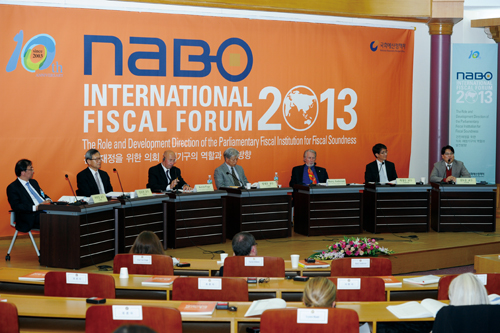The National Assembly Budget Office (NABO) organized the NABO International Fiscal Forum 2013 under the theme of “The Role and Development Direction of the Parliamentary Fiscal Institution for Fiscal Soundness” at the Parliamentarians’ Hall Conference room on Oct. 19.
Cook Kyung-bok, chief of NABO, said in his opening speech, “Worsening conditions at home and abroad are slowing down the pace of economic recovery in Korea and dealing a heavy blow to the tax base. The demand for fiscal spending is rapidly rising, especially for welfare, driven by the low birth rate and aging society.” He went on to say, “In this environment, it is very important to maintain fiscal soundness while meeting the demand for government spending by developing mid- and long-term strategies.”
“Korea’s fiscal position has been managed well so far, compared to other OECD member countries. We must maintain fiscal soundness as a last resort for sustainable economic growth in Korea, a country which has an open economic system, given that we now experience global economic instabilities almost every day,” Cook said.
“Therefore, it is very meaningful that NABO organized this forum and invited renowned experts from home and abroad to share their great wisdom and extensive experience on the role and future direction of a parliamentary fiscal body for fiscal soundness, and, ultimately, to seek practical alternatives.”

National Assembly Speaker Kang Chang-hee said in his congratulatory address, “Fiscal soundness has become a core challenge of the global economy. All of us agree that a high level of fiscal soundness is a prerequisite for sustainable and stable economic growth.” He added, “We have learned a huge lesson from the ongoing European fiscal crisis that fiscal soundness is not an issue of only one nation, but a challenge that the international community must meet together.”
_국경복 처장T.jpg)
NABO Chief Cook Kyung-bok delivers his opening
speech at the NABO International Fiscal Forum 2013.
_국경복 처장T.jpg)
Kang said, “There are so many factors that now compel us to be concerned about fiscal soundness. On the one hand, we have been witnessing stagnant growth and a slow improvement in the conditions necessary for an increase in tax revenue. Debt is piling up. And the potential growth rate has dropped to a very low level. On the other hand, the demand for fiscal spending is sharply increasing, especially for welfare programs such as the planned Basic Pension Scheme.”
He continued, “Korea needs to thoroughly prepare for measures such as fiscal consolidation policies that enable more welfare spending while boosting growth potential. And that leaves the National Assembly to take heavier responsibilities. This is why today’s forum has more significance as it gathers the wisdom and experience for re-establishing the role of a parliamentary fiscal institution and setting its future direction for fiscal soundness.”
“To keep our fiscal house in order, we need more than the government’s commitment and responses. The National Assembly must be, in particular, able to effectively and properly control national finances, which is one of its core legislative authorities. I hope NABO, a professional fiscal institution supporting parliamentary policies, will make an effort to review the fiscal consolidation experiences in many countries from various perspectives so that the National Assembly can control national finances more effectively,” Kang said.
_강창희의장축사Q.jpg)
National Assembly Speaker Kang Chang-hee gives his congratulatory address at the event.
Prof. Chun Joo-sung of Ewha Womans University chaired Session I. The keynote speakers of the session were Lisa Von Trapp, a policy analyst of the Budgeting and Public Expenditure Division at the Organization for Economic Cooperation and Developm-ent (OECD), who spoke about “Global Economic Crisis and the Role of the Parliamentary Fiscal Institution,” and Xavier Debrun, deputy chief of the Fiscal Policy and Surveillance, Fiscal Affairs Department at the International Monetary Fund, who gave a lecture on “Enhancing Fiscal Credibility: a Role for Independent Fiscal Institutions?”
In his presentation, Rep. Na Seong-lin of the ruling Saenuri Party argued that sustainability of state debts should continue to be monitored. “A controversy over how much debt the nation carries has surfaced, and state debts determined through diverse calculating methods need to be announced, and the sustainability of each calculation has to be checked and warnings to the general public should be sounded,” he said.
Rep. Lee Yong-sup of the opposition Democratic Party said the National Assembly must assert its checks-and-balances role over fiscal sustainability, saying the issue cannot be left only to the government. “In the process,” he said, “NABO should play a huge role in the process, and support should be offered in all areas including organization and budget to help NABO contribute to ensuring fiscal sustainability.”
Session II, themed “Increasing Mandatory Spending and Fiscal Soundness” was emceed by Prof. Yum Jae-ho of Korea University. The key speakers of the session were Kevin Page, former parliamentary budget officer of the Office of the Parliamentary Budget Office of Canada, and Barry Anderson, former acting director of the Congressional Budget Office of the United States. Anderson said, “More important than anything else is a strong political consensus supporting fiscal consolidation.” In order to reform spending programs — particularly those that provide health and pension benefits — and in order to reform tax expenditure provisions, he said, compromises will be needed. He noted unlike the United States, Korea’s political & social systems can better promote needed compromises and thus more easily achieve long-term fiscal sustainability.
Prof. Ha Yeon-seob of Yonsei University said, “In light of society’s steadily increasing demands for spending on welfare, such efforts on the spending side alone are not sufficient to realize fiscal soundness.” He said that in short, only a high quality of government can garner the public’s high level of confidence and then expand welfare programs and increase the tax burden. Only when a high quality of government with efficiency and democracy in place is guaranteed, fiscal soundness coupled with tax increases will be feasible,” he noted.
